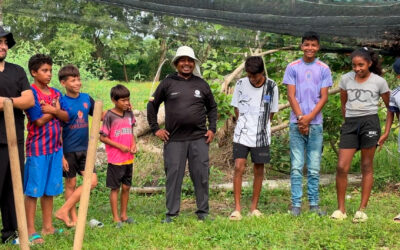 “I was standing near a stretcher in the Emergency Room when I saw two perfectly dressed women at the end of the corridor. They were followed by a small child whose jumpsuit was a bit too big. He appeared hesitant with his astonished gaze as he clutched a small airplane close to his chest. I wondered who the boy’s mother was because he didn’t resemble either one of the two who, by the way, answered in unison to every question about the boy’s health. Meanwhile, Vito sat on a clinic couch, refusing to give his airplane to the nurse who wanted to take a blood sample.” This is the story of Marina D’Antonio, an Italian doctor who says that she’s ‘in love’ with the Gospel. She has already racked up countless experiences with patients of all ages and backgrounds. And she says that she has always made an effort to set aside rules and impositions that often hide behind the white coat, and embrace the humanity of each patient that comes to her for treatment. In this story the main character is a child. We publish it as several hundred doctors and health care providers will soon gather in Padua, Italy for a two-day conference on the significance of health care in today’s world in the midst of globalization, sustainable practices and personalizing approaches to treatment. “Usually in these cases,” the doctor continued, “you seek the cooperation of the mother, but here they were again acting in unison, one on the right and one on the left. One of them pointed out to Vito that his aeroplane had to get into position on the runway (my desk) to bring aboard the second pilot. A small man made of red and black plastic magically popped out of the woman’s purse. Vito then waited to allow a regularly scheduled aeroplane to take off before his own. Meanwhile, I waited for the next episode that would allow the nurse to sink the butterfly needle into his forearm. And here it was: the nurse pulled her yellow cloth flower and red cloth butterfly. “Look Vito,” she said “the butterfly is drinking a bit of nectar from the flower. This one is green!” The little boy turned to watch as the professional nurse quickly inserted the green butterfly needle. The boy was no longer weeping, and the flight of the red butterfly began, pointing towards his forearm and softly landing a moment later after the nurse had covered the tiny wound with a colourful plaster. I was struck with admiration for these two exceptional mothers. The nurse, startled by something the women said, asked them: “But. . . why. . . how many children do you have?!!” They answered with a smile: ‘Well, at the moment we have 15.’ They explained that they were educators hired by a Family Home in the territory of our ASL. Vito’s mother had died of AIDS. His father was currently in a halfway house for drug addicts. The Juvenile Court keeps the child in Family Home until the statutory conditions are met for declaring him adoptable or not. Even though Vito was 4 years old, he didn’t talk. When I finished work, I didn’t go for lunch. I didn’t return home. I cancelled all my afternoon appointments. I put the address of the Family Home on my GPS and, when I reached the place, rang the doorbell impatiently. I asked if I could do something for them, anything. This was how my adventure at volunteering began alongside abandoned, abused and frightened children who always accepted my challenge: no matter what happened or what will happen, we will carry on playing. I began to play along with them. One afternoon on the large meadow that surrounds the Family Home a man landed with his colourful hang glider. Vito looked at me and, pointing to the hand glider, spoke his first word: “Daddy.” His first word, but packed with more meaning than if he had given an entire speech, poignant as the years of waiting to scan the skies. And finally, just a few days ago, it actually happened.”
“I was standing near a stretcher in the Emergency Room when I saw two perfectly dressed women at the end of the corridor. They were followed by a small child whose jumpsuit was a bit too big. He appeared hesitant with his astonished gaze as he clutched a small airplane close to his chest. I wondered who the boy’s mother was because he didn’t resemble either one of the two who, by the way, answered in unison to every question about the boy’s health. Meanwhile, Vito sat on a clinic couch, refusing to give his airplane to the nurse who wanted to take a blood sample.” This is the story of Marina D’Antonio, an Italian doctor who says that she’s ‘in love’ with the Gospel. She has already racked up countless experiences with patients of all ages and backgrounds. And she says that she has always made an effort to set aside rules and impositions that often hide behind the white coat, and embrace the humanity of each patient that comes to her for treatment. In this story the main character is a child. We publish it as several hundred doctors and health care providers will soon gather in Padua, Italy for a two-day conference on the significance of health care in today’s world in the midst of globalization, sustainable practices and personalizing approaches to treatment. “Usually in these cases,” the doctor continued, “you seek the cooperation of the mother, but here they were again acting in unison, one on the right and one on the left. One of them pointed out to Vito that his aeroplane had to get into position on the runway (my desk) to bring aboard the second pilot. A small man made of red and black plastic magically popped out of the woman’s purse. Vito then waited to allow a regularly scheduled aeroplane to take off before his own. Meanwhile, I waited for the next episode that would allow the nurse to sink the butterfly needle into his forearm. And here it was: the nurse pulled her yellow cloth flower and red cloth butterfly. “Look Vito,” she said “the butterfly is drinking a bit of nectar from the flower. This one is green!” The little boy turned to watch as the professional nurse quickly inserted the green butterfly needle. The boy was no longer weeping, and the flight of the red butterfly began, pointing towards his forearm and softly landing a moment later after the nurse had covered the tiny wound with a colourful plaster. I was struck with admiration for these two exceptional mothers. The nurse, startled by something the women said, asked them: “But. . . why. . . how many children do you have?!!” They answered with a smile: ‘Well, at the moment we have 15.’ They explained that they were educators hired by a Family Home in the territory of our ASL. Vito’s mother had died of AIDS. His father was currently in a halfway house for drug addicts. The Juvenile Court keeps the child in Family Home until the statutory conditions are met for declaring him adoptable or not. Even though Vito was 4 years old, he didn’t talk. When I finished work, I didn’t go for lunch. I didn’t return home. I cancelled all my afternoon appointments. I put the address of the Family Home on my GPS and, when I reached the place, rang the doorbell impatiently. I asked if I could do something for them, anything. This was how my adventure at volunteering began alongside abandoned, abused and frightened children who always accepted my challenge: no matter what happened or what will happen, we will carry on playing. I began to play along with them. One afternoon on the large meadow that surrounds the Family Home a man landed with his colourful hang glider. Vito looked at me and, pointing to the hand glider, spoke his first word: “Daddy.” His first word, but packed with more meaning than if he had given an entire speech, poignant as the years of waiting to scan the skies. And finally, just a few days ago, it actually happened.”
Silence your pride
Silence your pride




0 Comments